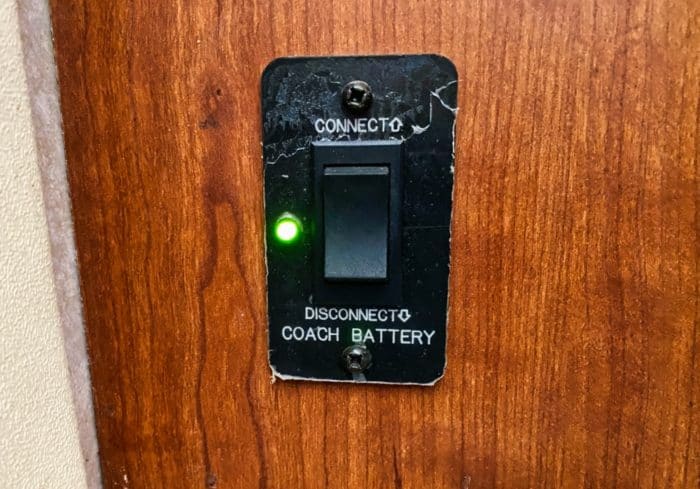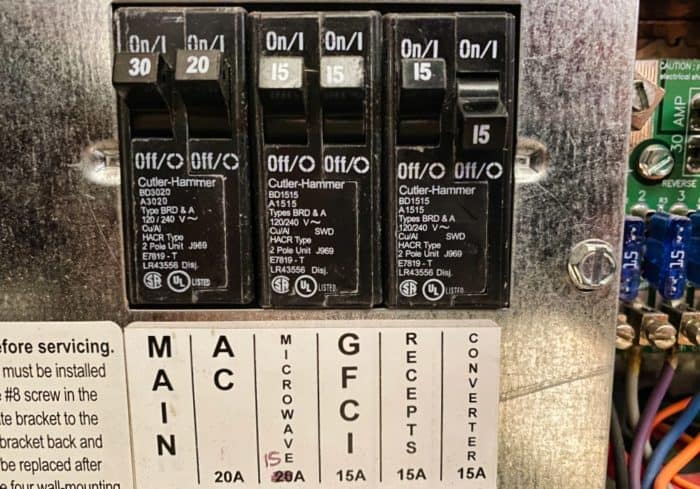Will An RV Converter Work Without A Battery?
An RV battery or house battery is used to run the 12 volt system in your camper.
When you connect your RV to electricity aka “shore power” you access the 120 volt system which runs things like the outlets, microwave, and air conditioner.
Related Product: Did you know RV Propane Detectors (click to view on Amazon) need to be replaced every 5-10 years? Make sure yours is still up to date before your next camping trip.
The main question is, does the RV converter also convert the 120 volt power to 12 volt to run that system as well?
The short answer is yes, RV converters do turn the 120 volt power to 12 volt. It’s actually the main job of an RV converter as well as charging the RV batteries when they are connected.
That means you technically don’t need to have a battery to run the 12V system when your RV is plugged into electricity.
There is a very rare case where an RV doesn’t have a converter that is made to do this without a battery connected, it’s usually very old campers that might have this problem.
To know for sure your RV converter’s manual should state if it will converter 120 volt power to 12 volt power.
In my 2010 Class C motorhome that uses a Parallax Power Supply 7100 series converter, it states in the manual and inside the breaker panel that “the converter does not require a battery to be connected to it for proper operation.”
Related Post: Considering an MPPT solar charge controller for your RV/van? Check out our review of the BougeRV MPPT here (we have an exclusive coupon code for you)
WFCO, another common RV converter brand, has also stated that their converters do not need a battery to operate (click to see FAQ section of WFCO’s website).
So the next questions are, should I and how do I disconnect my RV battery and what does an RV converter do exactly?
Below I’ll answer some of the common RV battery and converter questions as well as explain RV battery disconnect switches.
Should I Disconnect My RV Battery When Plugged Into Electricity?
Normally no, you shouldn’t disconnect your RV battery when plugged into shore power.
Unless you have a solar panel charger or external smart charger connected to your RV battery that’s a better charger than what your RV converter uses it’s normally better to not disconnect your RV battery.
See Also: What Will The RV Battery Run?
When To Disconnect The RV Battery
Storage
You should always disconnect the RV battery when you are leaving your camper unplugged for an extended amount of time, like when it’s in storage.
Most people will even take their RV batteries with them and store them indoors hooked up to a smart charger (like these) to keep the batteries properly maintained.
Maintenance
Anytime you are working on the electrical systems in a camper you want to disconnect the batteries.
For example, if you are fixing a fan or a light fixture you need your RV to be disconnected from both shore power and the batteries.
Even if you are working on something that should only be run by the AC 120 volt system it’s safer to disconnect the batteries as well.
To Use A Different Charger
RV converters can vary a lot, and so does the battery charging capabilities.
Some older RV converters basically just trickle charge a battery, which isn’t a good thing for an extended amount of time.
Other converters have better 3 stage chargers on them which make it safer for the battery to be connected to the converter and charger 24/7.
But not all of them have the smart charging capabilities, even a newer camper might just have a cheaper RV converter in it that isn’t going to do a good job keeping your battery from overcharging and getting damaged over time.
You can always swap out the RV converter with a better one but that takes a little bit of electrical know-how and new converters aren’t cheap.
For campers who sometimes stay in RV parks plugged into shore power and sometimes dry camp without any hookups getting a solar panel with a high quality solar charge controller is a great way to keep your RV batteries healthy.
See Also: When To Charge A Deep Cycle Battery
We have a solar set up like that in our motorhome. Our MPPT solar charge controller has a better and smarter battery charger in it than our RV does.
Whenever we are plugged into shore power we normally disconnect the house battery from the converter using our RV disconnect switch so it’s only hooked up to the solar panel and charge controller.
It stays charged via solar power and we don’t have to worry about the RV converter overcharging the battery over the month or so we are plugged into shore power.
The same concept could be applied by using an external smart battery charger. If you are staying in an RV park for a couple of months, disconnect the battery and keep it charged using a high quality battery charger instead of relying on the RV converter.
This isn’t necessary for all kinds of campers but if you have an older one like we do it’s a great inexpensive way to keep your RV batteries healthy.
Pros & Cons Of Disconnecting RV Battery When Plugged Into Shore Power
Pros
- If your RV has an old converter with a 1 stage trickle battery charger it will stop your house battery from being overcharged.
- Can isolate the battery and charge it with a smart charger instead of the RV converters charger.
Cons
- The battery is no longer being charged by your RV. (This can be fixed by using an external smart charger or solar panel to charge the battery)
- If shore power were to fail the 12 volt system will not work. For example, the fridge will not switch to gas because nothing is powering the circuit board.

RV Battery Disconnect Switch
To disconnect the battery from your RV you can always go outside and remove the positive and negative load wires. This works great and it’s a very sure way to disconnect your camper from the house batteries.
The only downside is it takes a lot of time to remove and replace the load wires on RV batteries, especially if you have other things connected or you have a large battery bank with multiple batteries that have cables connected all over the place.
One thing you can add to make the process a lot simpler is a battery disconnect switch (click to view on Amazon).
What It Does
A battery disconnect switch also known as a battery isolator does the same thing as manually removing the wires from the battery terminals.
It cuts off the connection to the batteries and the RV by creating a gap in the circuit on either the positive or negative side.
It’s recommended to install an RV battery disconnect switch on the negative side of the battery since the rule of thumb is to connect the positive load first then the negative.
If the switch cuts off the negative you are technically always connecting the positive first then the negative when you switch the batteries back on.
Just as a heads up it also stops the converter from charging the RV batteries.
Where It’s located
It actually can vary a lot where a battery isolator switch can be located. It really depends on what kind of RV battery disconnect is being used.
If it’s a master switch like this (click to view on Amazon) that is both the switch and the isolator in one unit it’s going to be located somewhere close to the batteries.
Most people will install one right on the battery box but I’ve also seen travel trailers with a switch like this installed inside the front under storage.
Usually, a switch like this won’t be very far from the batteries, not more than a few feet.
The second kind of RV battery disconnect switch that’s commonly found in motorhomes is a rocker switch like this (click to view on Amazon) that’s connected to a solenoid or relay (click to view on Amazon) that does the actually disconnecting.
The battery disconnect solenoid can be hard to find. It can really be anywhere in a motorhome, you have to follow the wires from the rocker switch which is often located just inside the camper door or near the “control center” that shows you all of the tank and battery levels.
When To Use It
Even if everything in your camper is turned off there are still small appliances that are going to leach power from your RV batteries.
Things like the motherboard on the fridge and water heater and the carbon monoxide sensors all take electricity which adds up over time.
When leaving your RV for storage it’s best to disconnect the batteries completely.
I recommend doing this even if you are going to have a charger connected because you don’t want the fridge to malfunction and suddenly decided to turn on or the carbon monoxide alarm to get tripped and start beeping until you get back.
The battery disconnect can also be used as a quick way to cut the power to your RV if you plan on working on parts of the electrical system.
It’s also a type of safety device if one of the 12 volt appliances starts to malfunction or if something goes wrong with the RV batteries.
Even if it’s not used all of the time most campers prefer to have one installed just in case.
What Does An RV Converter Do?
The RV converter is what turns 120 volt AC power into 12 volt DC power so you can run the 12 volt system in a camper without using the batteries.
It’s also what charges the batteries in your camper when you’re plugged into power.
When the converter is off your batteries are what’s powering your RV and they also aren’t getting charged.
You can turn the RV converter on or off via the breaker box. The converter is normally one of the 15 amp switches.
See Also: Best Deep Cycle RV Batteries (AGM, SLA, 12V, 6V)
How To Tell If An RV Converter Is Bad
There are a number of ways you can test your RV converter without using any tools.
First, if you plug into power and disconnect the house battery the lights, fans, and water pump should all work. If they don’t it means your RV converter isn’t turning the AC power to DC.
If the lights are flickering and acting strange this could also be a sign that the RV converter is going bad.
If your battery drains even when you are plugged into 120 volt AC power this could also be a sign that your RV converter doing what it should.
It means that your camper’s 12 volt system is using the battery for power and it also means that your RV batteries aren’t being charged.
When you are plugged into power the battery indicator on your RV should always display a 100% charge. If it doesn’t that could also indicate that your RV converter isn’t working.
If the converter has really gone bad there may be a popping noise from it or even a bit of smoke and an electrical burn smell.

In this case, you should disconnect your RV converter immediately by flipping its breaker if it hasn’t already done so on its own.
You might also want to disconnect your RV from power and disconnect the battery until the problem has been fixed.
RV Converter Buzzing Noise
Some RV converters make a light buzzing noise when plugged into power. Normally a little buzzing noise is normal and it might also just be noise from the cooling fan kicking on.
If the converter buzzing happens you can sometimes stop it by turning on a light to put a load on the converter which will switch the freqency.
If the buzzing noise is annoying at night, which it sometimes is, you can turn it off via the breaker.
Older RV converters are known for making an annoying buzzing noise and one way to fix it could be to swap it out for a newer one.
RV Life Hack: Equalize RV Batteries That Can’t Hold A Charge
If the noise seems unusually loud it could be a sign that the connection to the batteries is bad. Check the connections at the battery terminals to make sure they are clean and snug.
A bad battery could also be an issue. The converter may be having trouble charging it which could result in a buzzing noise.
The noise should only happen when you are plugged into shore power.
If the converter is making noises when your RV is only getting power from your battery this could be a sign of a faulty converter or battery disconnect relay if your camper has one.
Have any more questions about RV converters or disconnecting your RV battery? Leave a comment below.


Question my house battery is getting overcharged anytime I’m plugged into power. Would this be a bad Inverter?
Sounds like an RV converter problem, but it could also happen if you’ve replaced your house battery. What’s the model number of your converter charger, and what kind of battery do you have?
That’s a good point as to the type of battery that could have been replaced. With a lot of people switching over to lithium, not all converters other than the much newer RVs made support lithium batteries without also updating several of the supporting system electronics. We recently replaced our AC to DC converter, added a DC to AC inverter, as well as a DC to DC converter in order to properly utilize and maintain lithium batteries. This was a bit of a learning experience. But the improvement is unquestionably a huge YES.
Hi when I plug into shore power my house 🏠 batteries discharge. Once they are charged again they stay charged with solar until I plug into shore power, over the night they slowly run down, no lights, no air conditioner, no frig, the one thing working is the TV, does that make sense?
Thanks
God bless you
Hi Roger,
It sounds like maybe your RV isn’t charging your batteries and possibly the converter isn’t working either.
You should check the voltage of the batteries before you plug in your trailer and then after you plug it in to see if it goes up. If nothing changes your RV battery charger isn’t working right.
I would check behind the power center and make sure all of the cables have a tight connection (make sure you disconnect all power sources before doing this).
If everything looks good and the batteries still aren’t charging when connected to shore power you can try resetting the junction box that connects the batteries to the converter, usually, it’s somewhere near the batteries. The reset is a tiny black button on the side of the junction box.
If your batteries have been drained past 50% a lot and they aren’t holding a charge anymore they may need to be replaced once you get the RV charger fixed.
Hey Roger, have you put a meter on it to see how much voltage is being drained from the battery when this is happening? This might allow you to shut off different electronics and double check it each time to see which one is the culprit and exactly how much voltage/amperage
it’s drawing? I recently augmented the very simple “four light” system in our RV, that really tells you little to nothing with a digital meter that stays connected to the batteries, along with a shunt. This way when I switch systems, I can see exactly how much voltage the battery is either receiving or if there is a draw at any given time, and exactly how much. Also, you might want to check your batteries fluid levels if they are “wet batteries” (flooded, lead acid, AGM) as I’ve personally experienced where these can become overcharged literally cooking the fluid from the battery, causing the battery to malfunction and drain very fast when those fluid levels are too low.
I have solar power. Is it best to leave the main battery disconnect on in storage, to allow them to trickle charge?
During use or during long term storage? Also different batteries have a slightly different requirements depending on how they’re being used and or stored. Best to learn the use and store case for your battery system. My system in particular doesn’t really draw amperage from the battery when I’m on short power and I have the batteries turned it off. But if you’re running other systems on the batteries that are slowly draining them, I would think the answer would be yes you would want your DC to DC converter from solar to maintain that battery.
Just wanted to state that I wished I had found this article which outlines and details a lot of information that I needed just this last month when changing out all of my primary components that support new lithium ion batteries. Even though not battery specific, the information outlines, how the system functions, regardless It’s was still a good refresher read that I could’ve really used the information, had I known what I was looking for at that time. Well done!
Hi Daniel,
Thanks for saying all that, it’s really good to hear when our articles are helpful to other RVers.
Also, I see that you’ve commented a lot of useful information to others in this post. So thank you for that!